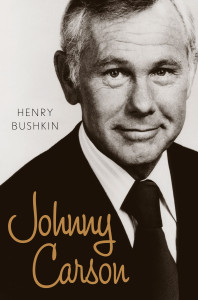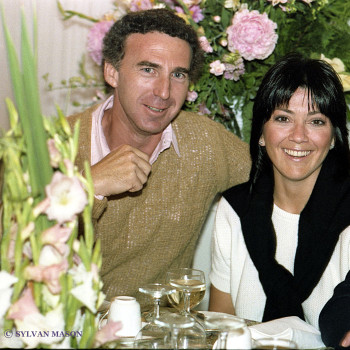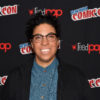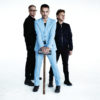Henry Bushkin was a confidant, lawyer, and friend to Johnny Carson, when Carson was the massively popular and publicly jolly host of “The Tonight Show.” The side of the legendary personality that Buskin witnessed, however, was less a charming host and more a self-absorbed show business despot. His new tell-all memoir – titled, simply, “Johnny Carson” – remembers what life was really like when the red “on air” light switched off.

Brendan Francis Newnam: It’s your memoir, but it is primarily about Johnny Carson who, while you were working with him, was one of the most popular people in America. The highest paid man in television. What made Johnny Carson so successful?
Henry Bushkin: The red light. Once the camera went on, he was on. He was the best there was when it came on and he figured that he gave it his all when it came on. That’s all he had to do and he wasn’t about to be energized for anything other than what he felt like being energized about off the air.
Brendan Francis Newnam: And off the air is where most of your book takes place, and the Johnny Carson we meet there isn’t nearly as jolly as the one on television.
Henry Bushkin: Well, long before I met him, he did an interview with Life Magazine where he said he’s basically an unhappy person. That’s what I inherited as a client.
Brendan Francis Newnam: Now the portrait of Carson that kind of emerges from this book is a dark one. He’s self-absorbed, he despotic, he’s not a very good father, he’s not a very good husband. This may sound kind of strange but I was wondering if you could share your worst memory of Johnny Carson?
Henry Bushkin: My worst memory?
Brendan Francis Newnam: Yeah, I’m just gonna go for it because this book starts with an ugly memory and they’re laced throughout.
Henry Bushkin: Well, no, I wouldn’t put it that way, I wouldn’t put it thusly: every major star you could think of is demanding in one way or another. Johnny was very much the star and very much demanding.
One that stands out most vividly had to do with the inauguration of President Reagan in 1981, where I actually got fired over the seating of his wife at the inaugural event. His wife happened to be sitting with my wife and we happened to see the seats they would be sitting in beforehand, and they were quite acceptable to us, meaning Johnny and myself. But Mrs Carson was unhappy with those seats and it lead to the ultimate call from Carson to me firing me, because she had gotten to him enough that he was now taking it out on me. And I think that was the worst moment, but I think it’s the most telling moment.
Ultimately a call from the President of the United States got me off the hook because President Reagan, in the midst of the Iranian hostage crisis, calls Johnny Carson and apologizes for the seating of his wife – which in conventional terms was nonsensical because she was in the eighth row rather than the third row.
 Brendan Francis Newnam: Well she was upset because Ed McMahon’s wife…
Brendan Francis Newnam: Well she was upset because Ed McMahon’s wife…
Henry Bushkin: …Happened to be sitting with Barbara Sinatra, who happened to be closer to the stage than Joanna Carson.
Brendan Francis Newnam: In your book, you have a theory that his mother was the source of his unhappiness. What were his issues with her?
Henry Bushkin: I don’t know where to begin. Look, if you could think of Midwestern Gothic, that’s who she was. And she ruled the roost, husband never said a word. If anything was addressed to him, he’d defer to her. And she was a cold, indifferent person, and gave no warmth to any of her kids, and Johnny suffered by it enormously because he never got any compliment from her. Always striving for something he was never gonna get from her. And he suffered from that, and every relation suffered because of that.
Brendan Francis Newnam: Brings to mind the story that he got [his parents] a cruise around the world, a 44-day trip. Got the tickets, took care of everything, first class. Didn’t hear from them the entire time, didn’t hear from them when they got back. Finally called his father, his father gives the phone to his mother, and he asked her how it was and she said “Oh, I’m just so happy to be home.”
Henry Bushkin: Precisely. But, the fun part of that, if you could think about it, is him calling me every day. “I still haven’t heard from them, still haven’t heard from them.” So I said, “Well why don’t you call them? You know exactly where they’re gonna be.” And he said, “No, no, I’m not gonna give them the satisfaction of calling them.”
Brendan Francis Newnam: How much of his behavior to you attribute to the era in which he lived and just the circumstances in which he lived, and how much comes from his struggle with his personal demons?
Henry Bushkin: He was no different than many, many, many. Indeed I’d say he was probably saner than most. His personal indiscretions, while not commendable… infidelity in Hollywood never ruined anybody’s career. It just never did.
Brendan Francis Newnam: But it is interesting in Carson’s case because you have the contrast of the friendly guy on TV who talks America into bed, and the cheating husband who has three naked women in the pool in his hotel suite in Las Vegas while he himself is wearing nothing but an apron and holding a bottle of 1966 white Burgundy.
Henry Bushkin: Not bad huh? A lot of guys would like to be in that position. But then again, that was Las Vegas, and that’s what did go on.
Brendan Francis Newnam: As your book notes, his behavior left a lot of wreckage in it’s wake. His inability to connect with his own family and even his inability to really genuinely be a friend. The famous interview you quote where the writer asks Johnny who he entertains at home and he said “My best friend, my lawyer, Henry Bushkin,” and when you read that you were taken aback because, although you may have been friends, it was always very clear that you were his employee and it’s strange that he would consider that a friendship.
Henry Bushkin: Well he died alone, so you could work backwards. He died all alone so he was, for 18 years with me, he wasn’t alone. We were practically inseparable.
Brendan Francis Newnam: One of the first questions when he first met you and took you on his lawyer was, “Do you play tennis?” And you did, and you were his tennis partner for years. In the book you talk about how you had to throw some games. Was that true?
Henry Bushkin: Well, I played for my college and was pretty good. Johnny was an adequate tennis player, but I was better than average so there was really no contest between us.
Brendan Francis Newnam: But he didn’t knew that, did he?
Henry Bushkin: Of course he knew that, but it didn’t matter. Of course he knew it. Of course he knew he should never win, but he always wanted to win. That’s the difference. He always thought he could win, he never did, he never, ever beat me, but he always was trying.
So I gave him a lot of credit but for me, often times, I was trying to manufacture a way for him to look good.
I can say it now, I would never have said it then. But I don’t know anybody more competitive than he was.
Brendan Francis Newnam: Another one of the great little tidbits in this book is when he sold his house in Malibu to John McEnroe, part of the escrow was that he was supposed to get six lessons.
Henry Bushkin: You bet. Absolutely. And he got them. He got them. McEnroe gave him the lessons.
Brendan Francis Newnam: In anger management?
Henry Bushkin: Look, they both could use control and anger management, but it was simply backhand I can assure you.


